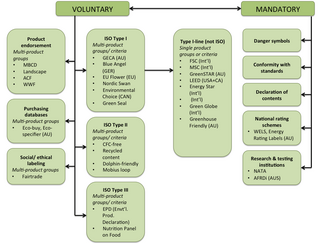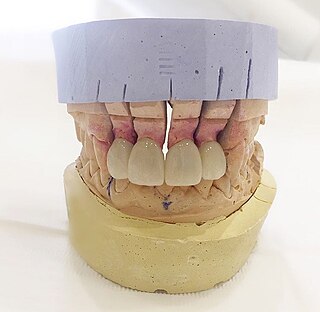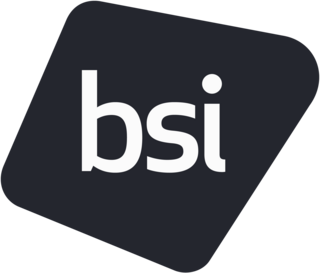Conformance testing — an element of conformity assessment, and also known as compliance testing, or type testing — is testing or other activities that determine whether a process, product, or service complies with the requirements of a specification, technical standard, contract, or regulation. Testing is often either logical testing or physical testing. The test procedures may involve other criteria from mathematical testing or chemical testing. Beyond simple conformance, other requirements for efficiency, interoperability, or compliance may apply. Conformance testing may be undertaken by the producer of the product or service being assessed, by a user, or by an accredited independent organization, which can sometimes be the author of the standard being used. When testing is accompanied by certification, the products or services may then be advertised as being certified in compliance with the referred technical standard. Manufacturers and suppliers of products and services rely on such certification including listing on the certification body's website, to assure quality to the end user and that competing suppliers are on the same level.
The ISO 9000 family is a set of five quality management systems (QMS) standards by the International Organization for Standardization (ISO) that help organizations ensure they meet customer and other stakeholder needs within statutory and regulatory requirements related to a product or service. ISO 9000 deals with the fundamentals and vocabulary of QMS, including the seven quality management principles that underlie the family of standards. ISO 9001 deals with the requirements that organizations wishing to meet the standard must fulfill. ISO/TS 9002 offers guidelines for the application of ISO 9001. ISO 9004 gives guidance on achieving sustained organizational success.
ISO 14000 is a family of standards by the International Organization for Standardization (ISO) related to environmental management that exists to help organizations (a) minimize how their operations negatively affect the environment ; (b) comply with applicable laws, regulations, and other environmentally oriented requirements; and (c) continually improve in the above.
UN/CEFACT is the United Nations Centre for Trade Facilitation and Electronic Business. It was established as an intergovernmental body of the United Nations Economic Commission for Europe (UNECE) in 1996 and evolved from UNECE's long tradition of work in trade facilitation which began in 1957.

Ecolabels and Green Stickers are labeling systems for food and consumer products. The use of ecolabels is voluntary, whereas green stickers are mandated by law; for example, in North America major appliances and automobiles use Energy Star. They are a form of sustainability measurement directed at consumers, intended to make it easy to take environmental concerns into account when shopping. Some labels quantify pollution or energy consumption by way of index scores or units of measurement, while others assert compliance with a set of practices or minimum requirements for sustainability or reduction of harm to the environment. Many ecolabels are focused on minimising the negative ecological impacts of primary production or resource extraction in a given sector or commodity through a set of good practices that are captured in a sustainability standard. Through a verification process, usually referred to as "certification", a farm, forest, fishery, or mine can show that it complies with a standard and earn the right to sell its products as certified through the supply chain, often resulting in a consumer-facing ecolabel.
In general, compliance means conforming to a rule, such as a specification, policy, standard or law. Compliance has traditionally been explained by reference to the deterrence theory, according to which punishing a behavior will decrease the violations both by the wrongdoer and by others. This view has been supported by economic theory, which has framed punishment in terms of costs and has explained compliance in terms of a cost-benefit equilibrium. However, psychological research on motivation provides an alternative view: granting rewards or imposing fines for a certain behavior is a form of extrinsic motivation that weakens intrinsic motivation and ultimately undermines compliance.
Accreditation is the independent, third-party evaluation of a conformity assessment body against recognised standards, conveying formal demonstration of its impartiality and competence to carry out specific conformity assessment tasks.

Certification is part of testing, inspection and certification and the provision by an independent body of written assurance that the product, service or system in question meets specific requirements. It is the formal attestation or confirmation of certain characteristics of an object, person, or organization. This confirmation is often, but not always, provided by some form of external review, education, assessment, or audit. Accreditation is a specific organization's process of certification. According to the U.S. National Council on Measurement in Education, a certification test is a credentialing test used to determine whether individuals are knowledgeable enough in a given occupational area to be labeled "competent to practice" in that area.
The Standards Council of Canada (SCC) (French: Conseil canadien des normes (CCN)) is a Canadian crown corporation with the mandate to promote voluntary standardization in Canada. The SCC is responsible for:
The National Standards Authority of Ireland (NSAI) is the International Organization for Standardization (ISO) member body for the Republic of Ireland. The NSAI is also a member of the European Organisation for Technical Approvals.
ISO 13485Medical devices -- Quality management systems -- Requirements for regulatory purposes is a voluntary standard, published by International Organization for Standardization (ISO) for the first time in 1996, and contains a comprehensive quality management system for the design and manufacture of medical devices. The latest version of this standard supersedes earlier documents such as EN 46001 and EN 46002 (1996), the previously published ISO 13485, and ISO 13488.

Dental laboratories manufacture or customize a variety of products to assist in the provision of oral health care by a licensed dentist. These products include crowns, bridges, dentures and other dental products. Dental lab technicians follow a prescription from a licensed dentist when manufacturing these items, which include prosthetic devices and therapeutic devices. The FDA regulates these products as medical devices and they are therefore subject to FDA's good manufacturing practice ("GMP") and quality system ("QS") requirements. In most cases, however, they are exempt from manufacturer registration requirements. Some of the most common restorations manufactured include crowns, bridges, dentures, and dental implants. Dental implants is one of the most advanced dental technologies in the field of dentistry.

The British Standards Institution (BSI) is the national standards body of the United Kingdom. BSI produces technical standards on a wide range of products and services and also supplies certification and standards-related services to businesses.
An environmental audit is a type of evaluation intended to identify environmental compliance and management system implementation gaps, along with related corrective actions. In this way they perform an analogous (similar) function to financial audits. There are generally two different types of environmental audits: compliance audits and management systems audits. Compliance audits tend to be the primary type in the US or within US-based multinationals.
The South African National Accreditation System (SANAS) is the official accreditation body for South Africa. Founded in 1996, SANAS is headquartered in Pretoria, South Africa. SANAS accreditation certificates are a formal recognition by the Government of South Africa that an organisation is competent to perform specific tasks.
A specification often refers to a set of documented requirements to be satisfied by a material, design, product, or service. A specification is often a type of technical standard.

The Bureau of Indian Standards (BIS) is the National Standards Body of India under Department of Consumer affairs, Ministry of Consumer Affairs, Food & Public Distribution, Government of India. It is established by the Bureau of Indian Standards Act, 2016 which came into effect on 12 October 2017. The Minister in charge of the Ministry or Department having administrative control of the BIS is the ex-officio President of the BIS. BIS has 500 plus scientific officers working as Certification Officers, Member secretaries of technical committees and lab OIC's.

NSF is a product testing, inspection, certification organization with headquarters in Ann Arbor, Michigan. NSF also offers consulting and training services worldwide.
The Ghana Standards Authority (GSA) formerly Ghana Standards Board (GSB) is a Government of Ghana agency responsible for the maintenance of acceptable standards for product and services and sound management practices in industries and public institutions in Ghana.
The National Standardization Agency of Indonesia is the International Organization for Standardization (ISO) member body for Indonesia. BSN is a non-ministerial Indonesian government agency with the main task of carrying out governmental tasks in the field of standardization and conformity assessment in Indonesia. The agency is also responsible to develop and maintain the Indonesian National Standard.







